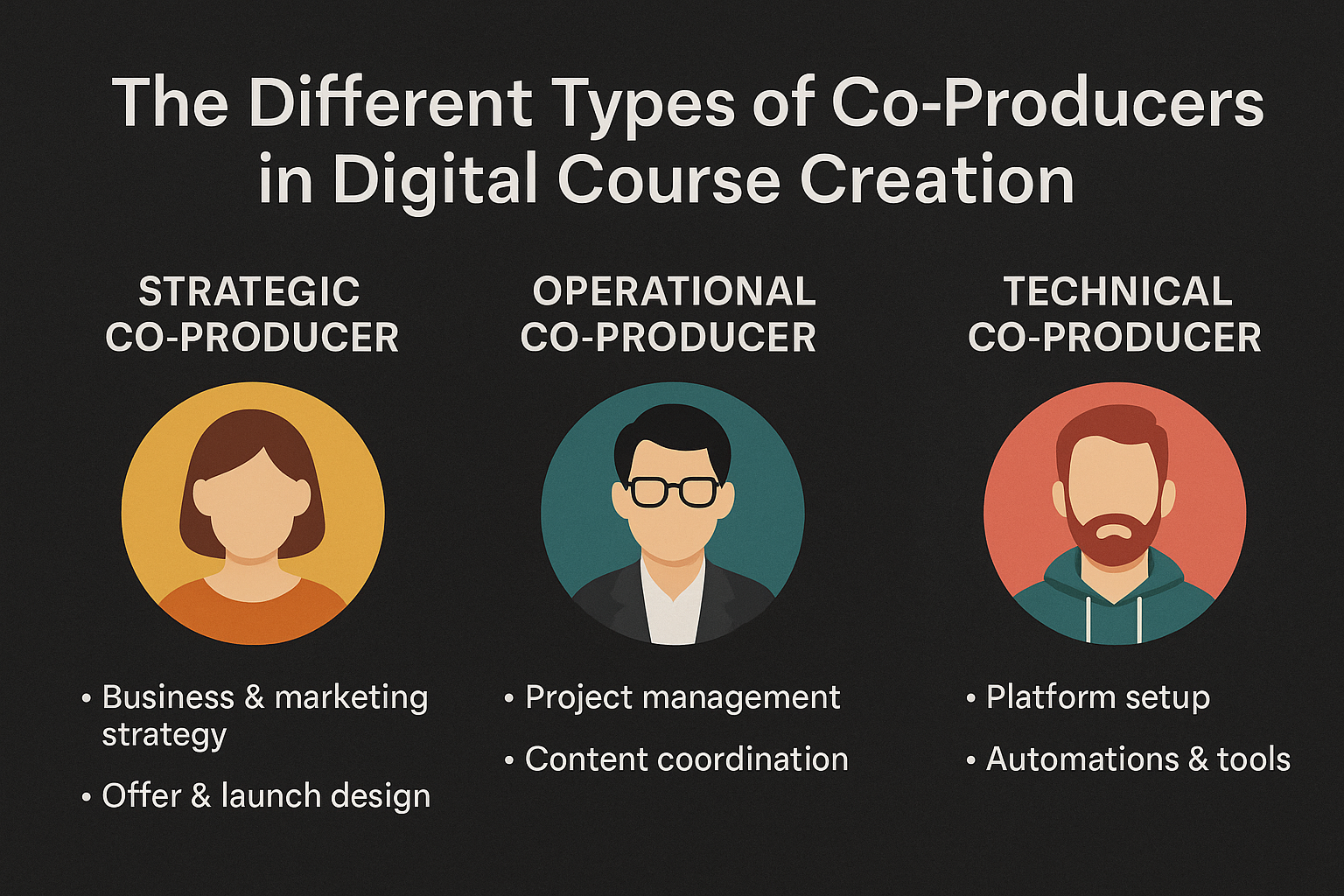Not all co-producers are the same — and that’s a good thing. In the growing world of online education, the term co-producer has evolved to include a variety of roles, skill sets, and strategies.
Whether you’re just starting out or looking to specialize, understanding the different types of co-producers will help you clarify your path, communicate your value, and build more strategic partnerships.
In this article, you’ll learn the three main co-producer profiles and how to choose the one that best fits your strengths and goals.
What Is a Co-Producer, Really?
A co-producer is someone who partners with an expert to bring their course to life. This means:
- Turning knowledge into a structured product
- Managing timelines and tools
- Driving sales through marketing strategy
- Sharing in the profits based on contribution
But not every co-producer handles the same responsibilities. Some are specialists, others are generalists. Let’s explore the three most common types.
1. The Strategic Co-Producer
The strategic co-producer is the brain behind the business. Their strength lies in seeing the big picture and building launch and monetization strategies that work.
Key Responsibilities:
- Market and competitor research
- Offer design and pricing
- Funnel architecture
- Launch models (e.g. seed, internal, perpetual)
- Campaign timing and coordination
Strengths:
- Deep understanding of digital marketing
- Good communicator and negotiator
- Capable of leading a team
- Able to align the product with real market demand
Ideal Partner For:
- Experts with an audience but no structure
- Businesses that want to scale education products
- High-ticket or evergreen products
✅ Strategic co-producers often own the roadmap of the course business and are seen as true business partners.
2. The Operational Co-Producer
The operational co-producer is all about execution. They thrive on making things happen — turning plans into action through organization, consistency, and attention to detail.
Key Responsibilities:
- Project management
- Setting up the course platform
- Managing the content calendar
- Coordinating team members (designers, editors)
- Setting up emails, checkouts, and automations
Strengths:
- Highly organized
- Detail-oriented
- Comfortable with tools and platforms
- Keeps the team on track and deadlines met
Ideal Partner For:
- Experts with a clear offer but no back-end structure
- Strategic marketers who need help executing ideas
- Agencies or large projects with many moving parts
✅ Operational co-producers are the engine of the project — keeping everything running smoothly.
3. The Technical Co-Producer
The technical co-producer focuses on the tools, systems, and automations that support the course infrastructure.
Key Responsibilities:
- Website and landing page development
- Platform integration (Hotmart, Kajabi, etc.)
- Email marketing setup and segmentation
- Analytics, pixels, and data tracking
- Troubleshooting bugs and UX issues
Strengths:
- Tech-savvy and up-to-date on tools
- Good with logic and automation flows
- Can build and troubleshoot fast
- Understands system performance metrics
Ideal Partner For:
- Experts or strategists who want full tech delegation
- Courses that rely heavily on automations or segmentation
- Launches that include webinars, timers, and advanced CRM flows
✅ Technical co-producers often work behind the scenes but are indispensable to a smooth student experience.
Bonus: The Hybrid Co-Producer
Some co-producers develop hybrid profiles, combining elements of two or all three types. This is common in solo co-productions or smaller teams.
Examples:
- Strategic + Operational: Ideal for mid-sized launches
- Technical + Operational: Great for evergreen products
- Strategic + Technical: Strong fit for data-driven businesses
✅ Hybrid co-producers are versatile — but be careful not to overextend yourself.
How to Choose Your Co-Producer Style
Ask yourself:
- Do I love strategy, or do I prefer following a plan?
- Am I more creative, logical, or organized?
- Do I enjoy working with people, systems, or both?
- What do I want to be known for in the market?
Also consider your past experiences, certifications, or skills you already use.
👉 Start with the profile that fits you best — and grow into other roles over time if needed.
Why Defining Your Type Matters
When you’re clear on your co-producer type, you can:
- Attract the right expert partners
- Set realistic expectations for roles and revenue split
- Build a portfolio that reflects your strengths
- Create authority in your niche
- Deliver better results and avoid burnout
✅ It’s easier to sell your services and negotiate your value when you know who you are.
Final Thoughts: There’s No One-Size-Fits-All Co-Producer
The digital education world needs all three types of co-producers to grow. Each brings unique value — and each can build a profitable, fulfilling career.
Whether you’re a strategist, a doer, or a tech expert, there’s space for your talents in this industry. The secret is to:
- Know your type
- Own your strengths
- Communicate your value clearly
The best co-productions are built by people who know their role and play it well.

